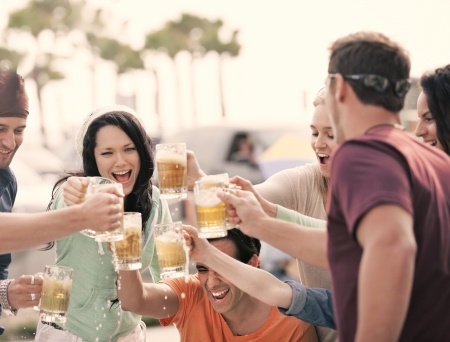Bars and Restaurants Can Be Held Liable for Drunk Spring-Breakers
Share March 20, 2017 | Category: DUIFlorida is party central for many college spring-breakers, and our hotels, restaurants and bars are making sure their properties are ready to receive the 26.3 million students who will be descending upon our beaches. These students are ready to relax, and often that relaxation includes large amounts of alcohol being consumed, according to USA Today.
 Promises Treatment Centers said in a 2015 article that there is a large risk of binge drinking and said the following:
Promises Treatment Centers said in a 2015 article that there is a large risk of binge drinking and said the following:
- Underage drinkers binge more than any other age group, with 92 percent of alcohol consumed by under-21s in the form of binge drinking.
- Data collected on college students show that about half of these young adults binge drink and do so especially excessively during spring break.
- Studies have found that college students specifically plan on drinking more than normal while on spring break and that male students report having 18 drinks per day and females 10 drinks per day on average.
Bars often “fuel the fire”
Many Florida hotels, restaurants and bars are very responsible in being sure our spring-break visitors have a good and safe time. However, there are some beverage retailers who may use questionable promotions such as two-for-one or all-you-can-drink specials, for example, to either gain a competitive advantage or maintain marketing parity. There are times, when tips are a significant part of a server’s income, the server may give “good service” by providing heavy pours and frequent replenishment of alcohol. These practices can cause spring-breakers not to make the right choices in moderating their behavior.
The National Conference of State Legislatures says that once a drinker reaches the point where he/she becomes intoxicated and can no longer make rational decisions, “responsibility for insuring the drinker’s safety and those the drinker may harm, shifts to the retailer through criminal and/or administrative prohibitions. Under these administrative and/or criminal laws, the retailer becomes his brother’s keeper.”
Dram shop laws
Under dram shop laws in most states, if an establishment serves alcohol, the business may be held accountable for any death, injury, or other damages caused by an intoxicated patron. Failing to act responsibly when serving alcohol can result in expensive civil and possibly criminal litigation, as well as fines, increased insurance rates, loss of a liquor license, or the loss of the business.
Florida and Nevada are exceptions to these dram shop laws as these states do not place criminal and/or administrative responsibility on the bar or the bartender/server, to monitor behavior. However, Florida’s law does allow for liability if alcohol is served to a known habitually addicted person or a minor, including under-age spring-breakers. Specifically, Florida law says:
768.125 Liability for injury or damage resulting from intoxication. A person who sells or furnishes alcoholic beverages to a person of lawful drinking age shall not thereby become liable for injury or damage caused by or resulting from the intoxication of such person, except that a person who willfully and unlawfully sells or furnishes alcoholic beverages to a person who is not of lawful drinking age or who knowingly serves a person habitually addicted to the use of any or all alcoholic beverages may become liable for injury or damage caused by or resulting from the intoxication of such minor or person.
Hotel bars and restaurants can, and should, establish programs regarding serving alcohol. These programs can include arrangements with local cab companies to be sure to get everyone home safely.
“If you or a loved one has been injured as a result of a bar or hotel violation of Florida’s laws, contact the experienced personal injury attorneys at Spivey Law Firm, Personal Injury Attorneys, P.A.,” said Fort Myers DUI Accident Attorney, Randall Spivey.
Hurt By Drunk Driver Attorney, Randall L. Spivey is a Board Certified Trial Attorney – the highest recognition for competence bestowed by the Florida Bar and a distinction earned by just one (1%) percent of Florida attorneys. He has handled over 2,000 personal injury and wrongful death cases throughout Florida. For a free and confidential consultation to discuss your legal rights, contact the Spivey Law Firm, Personal Injury Attorneys, P.A., in Lee County at 239.337.7483 or toll free at 1.888.477.4839, or by email to Randall@SpiveyLaw.com. Visit SpiveyLaw.com for more information. You can contact Spivey Law Firm, Personal Injury Attorneys, P.A.in Charlotte County at 941.764.7748 and in Collier County 239.793.7748.


